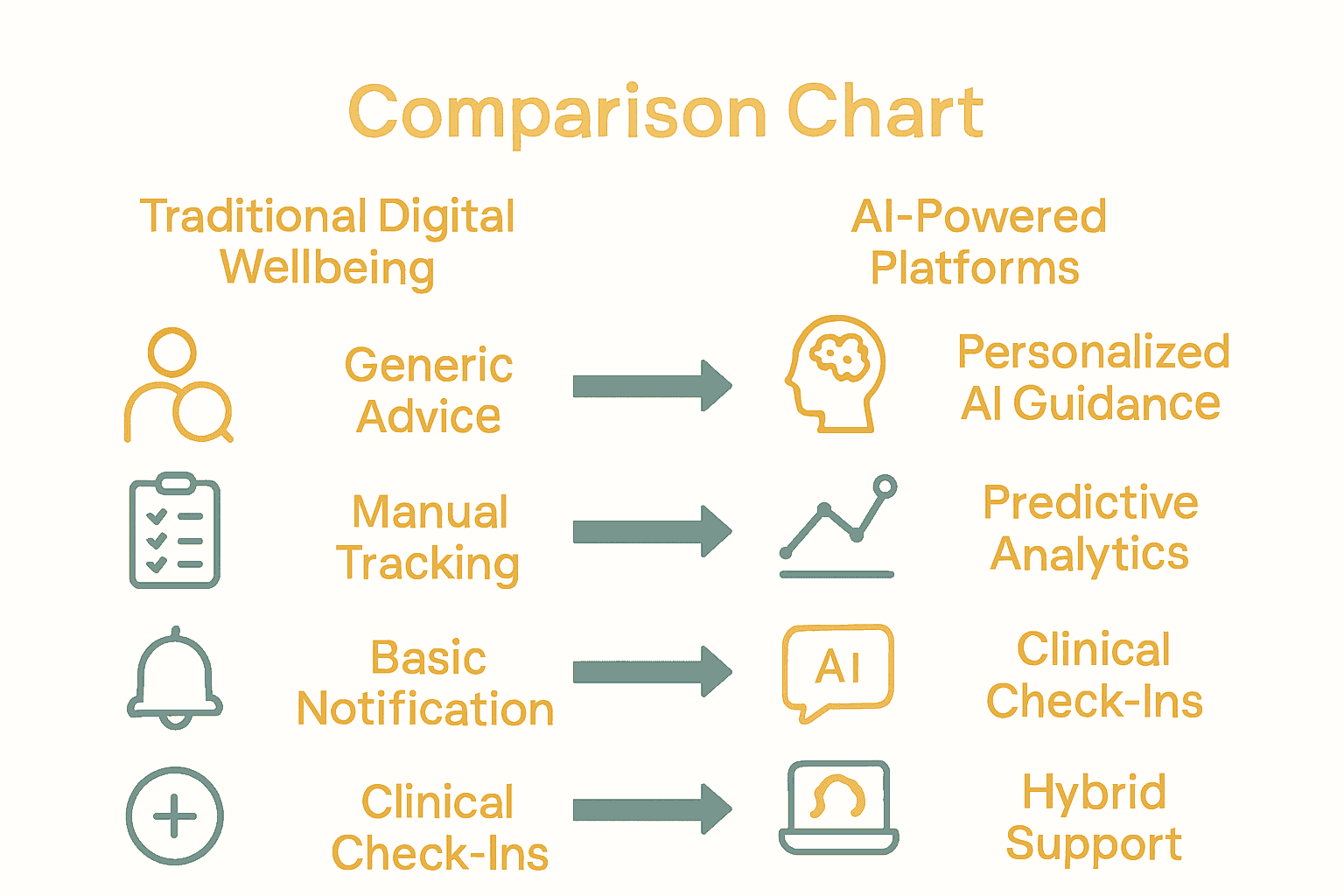Oct 16, 2025
Emotional Wellbeing in the Digital Age: Complete Guide
AI emotional coach guide: Explore modern digital wellbeing, live emotion detection, relationship superintelligence, and expert strategies for online self-care.

Emotional Wellbeing in the Digital Age: Complete Guide
Did you know that nearly 70 percent of people report feeling emotionally impacted by their time online? Digital life shapes how we experience everything from self-esteem to relationships, often behind the scenes. Understanding emotional wellbeing today means looking beyond traditional ideas of mental health. The way technology affects our feelings is more powerful than ever, and learning how to protect and improve our digital emotional health is now a daily concern.
Key Takeaways
Point | Details |
|---|---|
Understanding Digital Emotional Wellbeing | It’s essential to recognize how technology shapes emotional states and promotes the need for digital emotional resilience. |
Challenges of Online Interactions | Excessive use of digital platforms, especially social media, can lead to lower self-esteem and increased emotional vulnerability. |
Advancements in AI Support | AI emotional coaching systems offer real-time, personalized guidance, making digital emotional support more effective and adaptive. |
Best Practices for Online Health | Employ mindful digital interactions by setting boundaries and choosing clinically validated support tools that prioritize emotional wellbeing. |
Table of Contents
Defining Emotional Wellbeing In Today’s Digital World
Key Challenges To Wellbeing In Online Environments
How Ai Emotional Coaches Transform Digital Support
Essential Features Of Digital Wellbeing Tools
Best Practices For Protecting Emotional Health Online
Common Pitfalls And How To Avoid Them
Defining Emotional Wellbeing in Today’s Digital World
Emotional wellbeing in the digital era is no longer just about feeling good—it’s about navigating complex technological landscapes that profoundly shape our psychological experiences. Digital emotional health represents our ability to maintain psychological balance while interacting with increasingly sophisticated technological platforms that influence our mood, self-perception, and interpersonal connections.
According to a scholarly article from Springer, digital technologies have powerful “emotional affordances” that directly impact users’ emotional states. Our comprehensive guide on emotional intelligence explores how these digital interactions can reshape our emotional landscape. These platforms aren’t neutral conduits—they’re active environments that trigger, modulate, and sometimes manipulate our emotional responses.
Research reveals significant psychological implications of digital engagement. A systematic review examining adolescents worldwide discovered that excessive digital technology use, particularly social media, can negatively impact emotional wellbeing. The study highlighted crucial findings:
Lower self-esteem among frequent digital users
Higher rates of depressed mood
Increased emotional vulnerability in digital spaces
Understanding emotional wellbeing today means recognizing technology as an integrated part of our psychological ecosystem. It’s about developing digital emotional resilience—the capacity to engage with digital platforms consciously, maintaining psychological boundaries while leveraging technology’s connective potential. The goal isn’t digital abstinence, but mindful, intentional digital interaction that supports rather than undermines our emotional health.

Key Challenges to Wellbeing in Online Environments
Digital environments are complex psychological spaces that pose significant challenges to emotional wellbeing. Unlike traditional social interactions, online platforms create unique emotional dynamics that can subtly undermine our psychological health. According to research, social media’s design intentionally leverages emotional affordances—sophisticated mechanisms strategically crafted to capture and manipulate user attention and emotional responses.
Research from Frontiers in Psychology reveals alarming insights about digital technology’s impact, especially among younger users. Learn more about maintaining emotional wellness while navigating these digital landscapes. The systematic review highlights critical challenges:
Increased depressive symptoms
Lower self-esteem
Heightened emotional vulnerability
More pronounced negative effects for female users
The underlying problem stems from social media’s intricate design. As a scholarly article from Springer explains, these platforms employ sophisticated emotional manipulation techniques like:
Continuous notification systems
Engineered feedback loops
Algorithms that trigger dopamine responses
Endless scrolling mechanisms
These design elements systematically erode users’ self-regulation, creating environments that prioritize engagement over genuine emotional wellbeing. The result is a digital ecosystem that constantly pulls at our psychological strings, making conscious, intentional interaction increasingly challenging. Understanding these mechanisms is the first step toward reclaiming our emotional autonomy in an increasingly connected yet paradoxically isolating digital world.
How AI Emotional Coaches Transform Digital Support
Artificial intelligence is revolutionizing emotional support through intelligent coaching systems that understand human emotions with unprecedented depth and nuance. Unlike traditional digital interactions, AI emotional coaches can detect subtle emotional variations, offering personalized, adaptive guidance that responds dynamically to individual psychological states. Learn more about AI communication strategies and how technology is transforming emotional support.
Recent research reveals fascinating insights into AI’s emotional intelligence capabilities. A groundbreaking study demonstrated an advanced emotion detection system capable of identifying 27 nuanced emotional states, mapping them to personalized therapeutic interventions. This approach goes far beyond generic responses, creating a sophisticated emotional support ecosystem that adapts in real-time to users’ psychological needs.
Key transformative features of AI emotional coaching include:
Precise emotion recognition across 27+ emotional states
Adaptive, personalized guidance
Context-aware emotional support
Continuous learning and improvement
Another innovative research stream explores AI self-clone chatbots that replicate users’ unique conversational patterns. This approach dramatically increases emotional and cognitive engagement by creating a more authentic, personalized interaction. The implications are profound: AI can now potentially understand and mirror individual communication styles, making digital emotional support feel more genuine and meaningful.
These technological advancements represent more than just incremental improvements.
They signal a fundamental shift in how we conceptualize emotional support—transforming digital interactions from transactional exchanges to deeply empathetic, intelligent conversations that genuinely understand and support human emotional complexity.
Essential Features of Digital Wellbeing Tools
Digital wellbeing tools have evolved from simple tracking apps to sophisticated psychological support systems that leverage cutting-edge artificial intelligence. Explore our comprehensive resources on digital wellness, these platforms now offer nuanced, personalized emotional support that adapts to individual psychological needs.
According to a comprehensive 2025 overview of AI-powered wellbeing applications, the most advanced tools share critical features that distinguish them from traditional digital support platforms. These next-generation emotional support technologies are characterized by their multifaceted approach to mental health and personal growth:
Key Essential Features:
Empathetic Cognitive Behavioral Therapy (CBT) Conversations
Clinically validated emotional check-ins
Advanced mood tracking with predictive analytics
Conversational AI companionship
Hybrid human-AI support models
The distinguishing characteristic of modern digital wellbeing tools is their personalization intelligence. Unlike generic mental health resources, these platforms use sophisticated algorithms to create tailored experiences that recognize individual emotional landscapes. They don’t just respond—they learn, adapt, and provide contextually relevant support that feels genuinely responsive to a user’s unique psychological profile.
Moreover, these tools bridge technological innovation with psychological expertise. By integrating clinically validated methodologies with artificial intelligence, they transform digital interactions from transactional exchanges into meaningful, supportive conversations. The goal isn’t just to track emotions, but to provide intelligent, compassionate guidance that helps users develop deeper emotional awareness and resilience in an increasingly complex digital world.
Here’s a comparison of key features in next-generation digital wellbeing tools:

Feature | Traditional Tools | Modern AI-Powered Tools |
|---|---|---|
Emotional Support | Generic advice | Personalized, adaptive guidance |
Check-In Methods | Manual tracking | Predictive analytics, mood tracking |
Conversational Experience | Limited automation | Empathetic AI companionship |
Clinical Validation | Rare | Clinically validated approaches |
Human-AI Hybrid Support | No | Yes, hybrid models |
Best Practices for Protecting Emotional Health Online
Digital emotional resilience requires a strategic approach to navigating online environments that can significantly impact psychological wellbeing. Learn more about raising emotionally aware generations and understanding emotional protection strategies in digital spaces.
Research from leading mental health services highlights critical best practices for selecting and using digital emotional support tools. The key recommendation is to evaluate mental health technologies through a comprehensive lens that considers multiple critical factors:
Essential Evaluation Criteria:
Clinical validation of support methods
Level of personalization
Data transparency and privacy
Accessibility of support
Appropriate scope of emotional assistance
One emerging best practice is the adoption of hybrid support models that combine artificial intelligence with professional human oversight. These innovative approaches leverage technological convenience while maintaining the nuanced understanding that human professionals provide. Such models create a safety net that ensures users receive both algorithmically efficient and emotionally intelligent support.
Protecting emotional health online isn’t just about choosing the right tools—it’s about developing a mindful, intentional approach to digital interactions. This means setting clear boundaries, being selective about digital platforms, regularly assessing your emotional responses, and being willing to disconnect when digital environments become overwhelming. The goal is to transform digital spaces from potential emotional minefields into supportive, growth-oriented environments that genuinely contribute to your psychological wellbeing.
Common Pitfalls and How to Avoid Them
Digital emotional support platforms present complex challenges that require careful navigation. Discover strategies for understanding emotional coaching tools to help mitigate potential risks and maximize potential benefits.
Mental health professionals have raised significant concerns about unregulated AI chatbots and their potential psychological risks. According to recent research, these platforms can inadvertently create dangerous psychological dynamics, including:
Key Psychological Risks:
Emotional dependency
Worsening underlying anxiety
Inappropriate self-diagnosis
Inadequate crisis response
Potential reinforcement of harmful behavioral patterns
The legal landscape is also responding to these emerging challenges. Several U.S. states, including Utah, Nevada, and Illinois, have implemented regulations requiring transparency and human supervision for AI therapeutic interactions. These regulatory interventions underscore the critical need for responsible technological implementation in mental health support.
To protect yourself, adopt a proactive approach. Recognize that AI tools should supplement, not replace, professional mental health support. Maintain critical distance, regularly cross-reference AI guidance with professional advice, and be aware of your emotional responses during digital interactions. The goal is to leverage technological support intelligently while preserving your psychological autonomy and ensuring your emotional wellbeing remains the priority.
Ready to Regain Control of Your Emotional Wellbeing Online?
Struggling to manage your emotions in a hyper-connected world? You’re not alone. The article highlights how social media and digital platforms can drain self-esteem, increase emotional vulnerability, and make it hard to protect your emotional boundaries. You deserve better support for navigating these digital challenges. With the Wisdom App, you get more than generic advice. You experience live emotion detection, context-aware coaching, and relationship superintelligence right inside WhatsApp.

Start transforming your digital life with actionable insights, predictive guidance, and an empathetic AI coach who learns and adapts to your personal needs. Find out firsthand what makes Wisdom the AI emotional coach built for the modern digital age. Sign in now at https://app.wisdomnow.co/signIn and discover smarter ways to support your emotional wellbeing, connection, and self-awareness today.
Frequently Asked Questions
What is emotional wellbeing in the digital era?
Emotional wellbeing in the digital era refers to our ability to maintain a psychological balance while interacting with digital technologies that can influence our mood and relationships. It encompasses managing emotions in an increasingly connected world.
How can excessive digital technology use affect emotional health?
Excessive use of digital technology, particularly social media, can lead to lower self-esteem, higher rates of depressed mood, and increased emotional vulnerability, particularly among adolescents.
What are digital emotional resilience strategies?
Digital emotional resilience involves developing the capacity to navigate digital interactions mindfully, setting psychological boundaries, and leveraging technology’s benefits while mitigating its negative impacts on emotional health.
What features should I look for in digital wellbeing tools?
When evaluating digital wellbeing tools, look for empathetic cognitive behavioral therapy conversations, personalized emotional support, clinically validated check-ins, and a combination of human and AI assistance to ensure comprehensive, responsive emotional care.
Recommended








